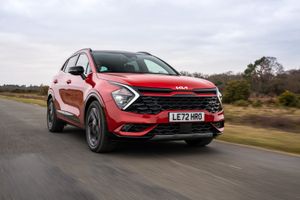UK car sales rise in June with JLR seeing mixed fortunes
New car sales rose by 1.1 per cent in the UK in June to 179,263.
However purchases of new cars by private buyers declined for a ninth consecutive month.
The Society of Motor Manufacturers and Traders said 67,625 new cars were registered by private consumers in June, down 15.3 per cent from 79,798 during the same month last year.
JLR had mixed fortunes in June. Land Rover sales were up 13.2 per cent to 5,246, but Jaguar dropped 19.8 per cent at 1,175. Engines for the cars are made at Wolverhampton.

MG, which is based at Longbridge but has its cars made abroad, was up 9.2 per cent to 8,314.
The leading brand was Volkswagen - up 1.8 per cent to 15,548 with the Kia Sportage the top selling model at 4,113.
The overall new car market grew year-on-year, mainly due to a 14.2 per cent increase in purchases for fleets owned or leased by businesses or other organisations.
This means more than a million new cars were registered in the first half of the year for the first time since 2019.
The overall new car market between January and June was up by six per cent compared with the same period last year.
The market share of pure battery electric new cars so far this year is 16.6 per cent, up from 16.1 per cent in the first half of 2023.
SMMT chief executive Mike Hawes said: "The year's midpoint sees the new car market in its best state since 2021 – but this belies the bigger challenge ahead.
"The private consumer market continues to shrink against a difficult economic backdrop, but with the right policies in place, the next government can re-energise the market and deliver a faster, fairer zero emission transition.
"All parties are agreed on the need to cut carbon and replacing older fossil fuel-based technologies with new electrified powertrains is the essential step to achieving that goal."
Ian Plummer, commercial director at online vehicle marketplace Auto Trader, said: "With average new car prices rising almost 40 per cent over the last five years, it's clear cost is the culprit.
"Manufacturers are responding with discounts but they're failing to keep pace, which is forcing many buyers to opt for a used alternative.
"Whoever forms the next government needs to address electric car affordability and provide long-term stability for the market."
Steve Gooding, director of motoring research charity the RAC Foundation, said: "It's hard to see how the market is going to shift up a gear in the months ahead.
"Many private buyers will probably want to see how the election results shake out and what they mean for household budgets.
"As to boosting the EV market, there seems little chance of subsidies for buyers being restored, so if prices of new battery-powered cars are going to align with those for petrol and diesel equivalents then manufacturers will have to take the financial hit rather than the taxpayer."
Richard Peberdy, UK head of automotive for KPMG, said: “New car sales are above levels seen this time last year, with fleets continuing to be the driver of growth in the market."
Sue Robinson, chief executive of the National Franchised Dealers Association said June was the 23rd month of consecutive growth for the new car market.
“Although the new electric vehicle market has seen another month of growth, the overall year-to-date market share of electric vehicles remains well below the 22 per cent target stipulated by the Zero-Emission Vehicle Mandate. Private demand continues to lag behind fleet, making it clear that revitalising the private electric vehicle market is a pressing issue that must be addressed immediately," she added.
John Wilmot, chief executive of car leasing comparison website LeaseLoco, said: "Urgent measures are needed to reignite private buyer interest in electric vehicles. Although many BEV models are available and supported by manufacturers' offers, the absence of government incentives for private motorists continues to be a significant obstacle."





